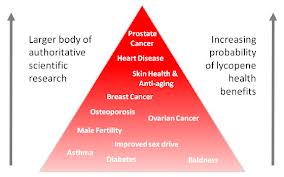Lately a lot of attention has been directed to the health benefits of vegetables and fruit. Vitamin C has long been an accepted household term, and nobody questions the benefits. Newer buzz words are the terms “bioflavonoids” and “antioxidants”. Some products are aggressively marketed extolling the above named beneficial substances, but often the consumer is left mildly bewildered by exaggerated claims. Often the sale prices of these miracle foods are as lofty as the bold statements that go along with them.
For any shopper it is important to know that some of the most beneficial foods are not high priced items, but very common staples. Take tomatoes, for instance. They are a significant source for the substance lycopene, which lately has received a lot of attention. Lycopene and its dietary sources as well as its benefits have been researched world wide, and the results are now in. It is responsible for the red color in fruit or vegetables, such as tomatoes, and its isomeric form 5-cis-lycopene is the most stable form having the highest antioxidant properties. Common dietary sources are tomatoes, watermelons, pink guava, pink grapefruit, papaya, apricot and other fruit. In the Western diet tomato-based foods account for about 85% of dietary sources of Lycopene. Studies have shown that lycopene is more efficiently absorbed from processed tomato products compared to raw tomatoes. Once it is absorbed it is distributed throughout the body. The highest levels showed up in the testes, the adrenal glands, prostate, breast and liver.
Research going back to 1995 showed an inverse relationship between the consumption of tomatoes and the risk of prostate cancer. A follow up publication in 1999 showed that the same inverse relation of lycopene intake and cancer also included breast, cervical, ovarian, liver and other organ sites. Further studies have followed these initial publications, and the great majority of them suggest that an increased intake of lycopene showed an association with a significant reduction in the risk of many cancers.
Coronary heart disease and lycopene benefits were also examined. The strongest population based evidence comes from a multi center case control study in Europe (EURAMIC). 662 Cases and 717 controls were recruited from 10 different European countries, and there was a significant relationship between levels of lycopene in fatty tissue and the risk of myocardial infarction. Lower lycopene levels were associated with a higher risk of heart attacks.Lycopene was also shown to decrease levels of oxidized LDL (LDL or low density lipoprotein is known as the “bad” cholesterol). Another small study showed that lycopene was reducing total cholesterol levels and as a result was lowering the risk of coronary heart disease (CHD).
The list of benefits does not end here: the dietary oxidant reduces oxidative stress and levels of bone turnover markers, meaning that it may contribute to the bone health, especially reducing the risk of osteoporosis in postmenopausal women.
For people with mild hypertension (high blood pressure), consumption of lycopene resulted in significant reductions of systolic and diastolic blood pressures.
Infertility in males was significantly helped by lycopene intake. In a study infertile man received 8 mg lycopene per day in capsule form. Laboratory tests confirmed an increased sperm density along with functional sperm concentration and mobility. This treatment protocol with lycopene supplementation resulted in a success rate of 36% pregnancies in their partners.
Pregnant women with pre-eclampsia who were treated with lycopene supplement significantly improved, which was shown by decreased diastolic blood pressure, the reduction of pre-eclampsia and a decrease of intrauterine growth retardation, resulting in a healthier mother and baby.
Future research is pending surrounding lycopene in metabolic and inflammatory diseases and in its role of possibly preventing neurodegenerative diseases such as Alzheimer’s disease. Other inflammatory conditions such as arthritis and emphysema will likely also be shown to benefit from lycopene. Preliminary data has already indicated this.
The Food and Drug Administration (FDA) of USA has recently approved lycopene as a safe “natural coloring agent” and a Generally Recognized as a Safe (GRAS) component. The Department of Nutritional Sciences , Faculty of Medicine, University of Toronto, c/o Dr. A.V. Rao et al. who completed this meta analysis of the recent literature have recommended that we all consume a regular daily lycopene dose in our food and supplements as part of our diet for good health.
More info about lycopene and prostate cancer: http://nethealthbook.com/news/lycopene-reduces-prostate-cancer-risk/
Reference: The Whitehall-Robins Report, December 2006, Volume 15, No.4
Last edited November 2, 2014






